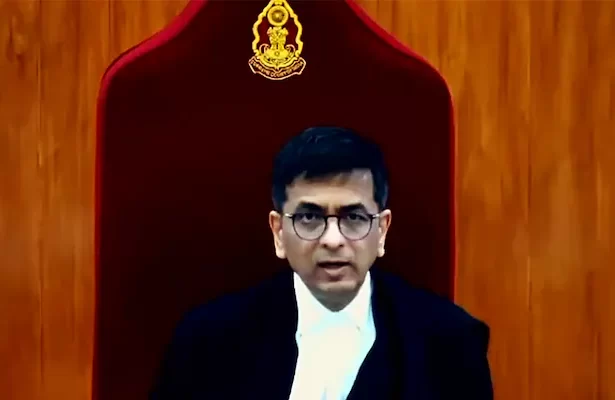New Delhi — Chief Justice of India DY Chandrachud has voiced his strong disapproval of a concerning trend among lawyers in the courtroom, where multiple advocates mention the same case before the bench in an attempt to secure a hearing date. This “new practice” has raised alarms regarding courtroom decorum and the integrity of legal proceedings.
The Emerging Trend in Legal Proceedings
During a recent session, Chief Justice Chandrachud expressed his frustration with this tactic, stating, “This is a new practice. Different counsels mention the same case for listing, and once a judge blinks, you get some date.” He emphasized that this method undermines the sanctity of the judicial process and cannot be tolerated.
The Chief Justice further elaborated that the discretion he holds as the Chief Justice would not be exercised favorably in such circumstances. “You cannot take the court for a ride. My personal credibility is at stake. I have to follow standard rules for all,” he asserted. This statement reflects his commitment to maintaining the integrity of the judicial system and ensuring that all legal practitioners adhere to the established protocols.
Emphasis on Proper Courtroom Etiquette
The Chief Justice’s criticism comes in the context of his ongoing efforts to uphold decorum in the courtroom. Since assuming office, he has made it a priority to ensure that proper processes are followed and that lawyers respect the rules governing court proceedings. This includes not only the manner in which cases are presented but also how lawyers conduct themselves during hearings.
In several instances, Chief Justice Chandrachud has reprimanded lawyers for disrupting proceedings or addressing the bench inappropriately. His focus on maintaining a respectful atmosphere in the courtroom underscores the importance of professionalism within the legal community.
Instances of Disrespectful Behavior
In a recent hearing, the Chief Justice addressed a lawyer who casually used the informal expression “yeah” while mentioning a matter in court. The Chief Justice reacted sharply, stating, “This is not a coffee shop! What is this yeah yeah? I am very allergic to this yeah yeah. This cannot be allowed.” This comment highlights the Chief Justice’s dedication to upholding formalities and ensuring that courtroom interactions remain respectful and dignified.
The Chief Justice’s remarks serve as a reminder that the courtroom is a place of serious business and should be treated as such. His stance aims to foster an environment where legal matters are addressed with the gravity they deserve, free from casual or disrespectful language.
Upholding Legal Standards
Chief Justice Chandrachud’s criticisms are part of a broader initiative to reinforce the standards and protocols that govern legal proceedings in India. By addressing these emerging practices directly, he seeks to deter further instances of such behavior and encourage lawyers to respect the processes established by the judiciary.
The Chief Justice’s commitment to maintaining decorum is essential in preserving the integrity of the legal system. His insistence on following procedures ensures that all parties are treated equitably and that justice is administered fairly.
As the legal landscape continues to evolve, the Chief Justice’s firm stance against unprofessional practices in the courtroom is a crucial step toward safeguarding the credibility of the judiciary. By calling out behaviors that undermine the judicial process, he sets a standard for legal practitioners to follow.
The emphasis on decorum, respect, and adherence to established protocols serves not only to uphold the integrity of court proceedings but also to reinforce the public’s trust in the legal system. In a profession where credibility is paramount, Chief Justice DY Chandrachud’s leadership is instrumental in steering the judiciary toward a more disciplined and respectful future.
As the legal community reflects on these remarks, it is essential for all practitioners to embrace the principles of professionalism and decorum that the Chief Justice advocates. This commitment will ultimately strengthen the legal system and contribute to a more just and equitable society.


